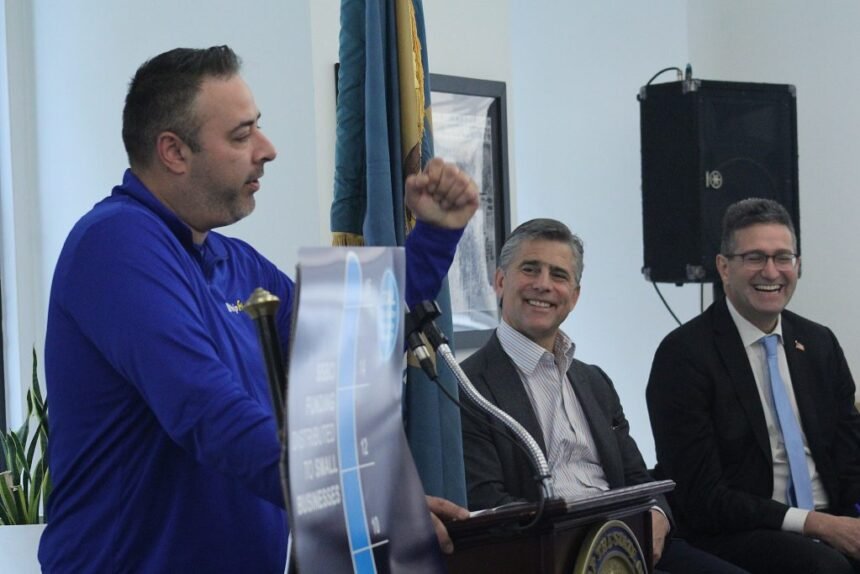WILMINGTON — Delaware is at risk of leaving $40 million in federal funding on the table if leaders don’t issue the $14 million it currently has earmarked for small business loans from federal funding sources, as well as capital funding, before the hard deadline at the end of the year.
But Governor Matt Meyer and Division of Small Business Director CJ Bell both believe that issuing the funds in time will be possible. On Thursday, both men called on small businesses, start-ups and entrepreneurs to apply for the funding in the State Small Business Credit Initiative (SSBCI) which includes loans and seed funding in partnership with lenders.
“We should be flooded with applicants so that we can go back [to our federal delegation] and say this is creating hundreds of jobs, if only there were more resources,” Meyer told a crowd at the Mill on Thursday. “But it starts in this room. It starts with working with the networks that exist to make sure we put our best foot forward and be the startup hub that e.i. du Pont dreamed of when he started DuPont in 1802.”
The U.S. Treasury Department won’t allocate the next round of funding for the little-known financing options. In 2023, the Division of Small Business was awarded $60 million in federal funding via three allocations with the requirement that it must spend at least $16 million in three years to access the next round.
So far, only $3 million has been issued between three businesses through the program.
“I promise you, we will do it, or I will not be standing here next to Gov. Meyer, I can tell you that,” Bell joked. “We want to be bullish in our direct, accelerated and seed capital programs, and we plan to revise our programs to be more incentive-based for lending institutions.”
The governor and Bell were joined at the Mill by other figures from programs that have supported start-ups like The Innovation Space, the Delaware SBDC and the Delaware Prosperity Partnership, as well as other entrepreneurs in northern Delaware for the announcement.
The SBBCI features four programs, including two loan-based programs where Community Development Financial Institutions (CDFIs), credit unions and banks can be granted funds for low-interest loans for up to 10 years. In the Delaware Loan Participation Program, the state contributes half the cost of the capital, up to $10 million. The Delaware Capital Access Program requires that business owners, financial institutions and the state contribute about 2% of the loan in case of default.
Bell said that the pledge to fund a portion of an allocation to be used for a reserve fund could spark more interest from lenders, as only Community Bank in Lewes, True Access Capital and Del-One Federal Credit Union have signed up. He’s planning to reach out to prospective lenders across the state to raise visibility of the program.
“We incentivize private entities to help give access to capital for people that otherwise might not have a chance to get maybe $100,000 loan, but don’t have the collateral, don’t have the credit history, and so on. Now, you might want to take a loan out,” he said.

The SBBCI also includes an Accelerator and Seed Capital Program, where startups or companies with fewer than 100 employees can access up to $1 million in funding after the company has completed a round of fundraising.
Carbon Reform, founded by University of Delaware alumni Nick Martin and Jo Norris, was the first company to receive funding from the Accelerator and Seed Capital Program. Their company works on carbon capture, specifically by retrofitting HVAC units for homes and offices, and has since grown from a 100 square-foot office to a larger office in The Innovation Space.
The startup will use the $500,000 seed funding to expand its portfolio in Delaware, including patents to convert into commercial technology.
Martin told the crowd that he was a strong case for Delaware’s entrepreneurial ecosystem, as he used to come to the Mill to work on a previous nonprofit project, later consulted for the Division of Small Business and participated in Leadership Delaware.
“I am really a product of what this state can create in terms of entrepreneurship, and I feel what we’re doing at Carbon Reform is a culmination of all those professional experiences that led us to this point,” he said.
Roger Clappe may also be another entrepreneur in Delaware on the verge of the next big idea. In 2021, he started WhipFlip, a technology company that allows people a chance to sell their cars to the company, which in turn sells them to wholesalers, dealers and fleet companies.
Based out of the Mill, the company has now moved into one of the large corner offices there and is now operating in nine states and the $500,000 in seed funding will help push that further. A Delcastle Technical High School grad, Clappe thinks of himself as always being backed by his home state.
“I’m incredibly proud of [my own state] and I feel a tremendous responsibility to champion this,” he said. “Yes, maybe WhipFlip can do good and become big… but what’s important to me is how do we bring in more technology companies like us. Delaware is certainly stepping up in every single direction right now to put that message out there.”
For more information about the SBBCI programs, visit business.delaware.gov/state-small-business-credit-initiative-ssbci/









